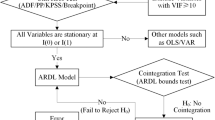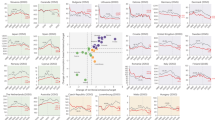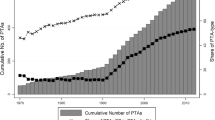Abstract
The Kyoto Protocol required most developed countries collectively to reduce their greenhouse gas (GHG) emissions about 5% below 1990 levels by 2012. Despite the binding nature of each country’s emissions-limitation target, levels of compliance varied greatly. What explains this variation in compliance? This article shows that the amount of material consumption within each country may contribute to answering this question. Using cross-sectional time-series data analysis for 36 Annex I (developed) countries from 2000 to 2012 and controlling for a range of domestic and international factors, quantitative analysis shows that compliance with emissions targets is least likely to be realized in countries with higher levels of consumption. This tendency has vitally important implications for agreements on future emissions limitations because those agreements must include more of the large developing countries that are intent on raising their own citizens’ consumption toward levels in the developed world. Without addressing consumption behaviors and the policy implications thereof, adequately mitigating GHG pollution in the future, notably through the 2015 Paris Agreement, will be extremely difficult.

Data source: UNFCCC (2000–2014)

Similar content being viewed by others
References
Barrett, S., & Stavins, R. (2003). Increasing participation and compliance in international climate change agreements. International Environmental Agreements: Politics, Law and Economics, 3, 349–376.
Bättig, M. B., & Bernauer, T. (2009). National institutions and global public goods: Are democracies more cooperative in climate change policy? International organization, 63(2), 281–308.
Beck, N., & Katz, J. N. (1995). What to do (and not to do) with time-series cross-section data. American Political Science Review, 89, 634–647.
Behrensa, A., Giljuma, S., Kovandab, J., & Nizac, S. (2007). The material basis of the global economy: Worldwide patterns of natural resource extraction and their implications for sustainable resource use policies. Ecological Economics, 64(2), 444–453.
Breitmeier, H., Young, O. R., & Zurn, M. (2006). Analyzing international environmental regimes: From case study to database. Cambridge, MA: MIT Press.
Bulkeley, H. (2013). Cities and climate change. Oxford: Routledge.
Bulkeley, H., & Broto, V. C. (2012). Government by experiment? Global cities and the governing of climate change. Transactions of the Institute of British Geographers, 38(3), 361–375.
Cameron, A. C., & Trivedi, P. K. (2010). Microeconometrics using stata. College Station: Stata Press.
Chasek, P. S., Downie, D. L., & Brown, J. W. (2014). Global environmental politics. Boulder: Westview Press.
Chayes, A., & Chayes, A. H. (1995). The new sovereignty: Compliance with international regulatory agreements. Cambridge, MA: Harvard University Press.
Cheon, A., & Urpelainen, J. (2013). How do competing interest groups influence environmental policy? The case of renewable electricity in industrialized democracies, 1989–2007. Political Studies, 61(4), 874–897.
Dauvergne, P. (2008). The shadows of consumption: Consequences for the global environment. Cambridge, MA: MIT Press.
DeGraaf, J., Wann, D., & Naylor, T. H. (2001). Affluenza: The all-consuming epidemic. San Francisco: Berrett-Koehler.
European Environment Agency. (2014). Environmental indicator report 2014. Luxembourg: Publications Office of the European Union.
Fisher, D. R., & Freudenburg, W. R. (2004). Postindustrialization and environmental quality: An empirical analysis of the environmental state. Social Forces, 83(1), 157–188.
Gonzalez, M., & Lucky, M. (2013). Fossil fuels dominate primary energy consumption. Washington: Worldwatch Institute. http://www.worldwatch.org/fossil-fuels-dominate-primary-energy-consumption-1.
Haas, R., Panzera, C., Rescha, G., Ragwitzb, M., Reecec, G., & Heldb, A. (2011). A historical review of promotion strategies for electricity from renewable energy sources in EU countries. Renewable and Sustainable Energy Reviews, 2011, 1003–1034.
Harris, P. G. (2013). What’s wrong with climate politics and how to fix it. Cambridge: Polity.
Harris, P. G. (2014). Climate policy: Risk-averse governments. Nature Climate Change, 4, 245–246.
Harris, P. G., & Symons, J. (2013). Norm conflict in climate governance: Greenhouse gas accounting and the problem of consumption. Global Environmental Politics, 13(1), 9–29.
Harrison, K., & Sundstrom, L. M. (2007). The comparative politics of climate change. Global Environmental Politics, 7(4), 1–18.
Hertwich, E. G. (2011). The lifecycle environmental impacts of consumption. Economic Systems Research, 23(1), 27–47.
Howlett, M. (2014). Why are policy innovations rare and so often negative? Blame avoidance and problem denial in climate change policy-making. Global Environmental Change, 29, 395–403.
International Energy Agency. (2014). CO 2 emissions from fuel combustion. Paris: International Energy Agency.
Jorgenson, A. K. (2006). Global warming and the neglected greenhouse gas: A cross-national study of the social causes of methane emissions intensity, 1995. Social Force, 84(3), 1779–1798.
Kutting, G. (2014). Consumption: Institutions and actors. In P. G. Harris (Ed.), Routledge handbook of global environmental politics (pp. 205–214). Oxford: Routledge.
Kysar, D. A., & Vandenburgh, M. P. (2008). Climate change and consumption. Environmental Law Reporter, 38, 10825–10834.
Lachapelle, E., & Paterson, M. (2013). Drivers of national climate policy. Climate Policy, 13(5), 547–571.
Lee, T. (2015). Global cities and climate change: Translocal relations and environmental governance. New York: Routledge.
Lee, T., Lee, T., & Lee, Y. (2014). An experiment for urban energy autonomy in Seoul: The one ‘less’ nuclear power plant policy. Energy Policy, 74, 311–318.
Marshall, M. G., & Jaggers, K. (2007). POLITY IV project: Dataset users’ manual. Vienna: George Mason University, Center for Systemic Peace.
Mines, R. O. (2014). Environmental engineering: Principles and practice. Oxford: Wiley-Blackwell.
Myers, N., & Kent, J. (2013). The new consumers: The influence of affluence on the environment. Washington, DC: Island Press.
National Oceanic and Atmospheric Administration (NOAA). (2016). Trends in atmospheric carbon dioxide. http://www.esrl.noaa.gov/gmd/ccgg/trends/.
Neumayer, E. (2002). Do democracies exhibit stronger international environmental commitment? A cross-country analysis. Journal of Peace Research, 29(2), 139–164.
Newell, P. (2008). Civil society, corporate accountability and the politics of climate change. Global Environmental Politics, 8(3), 122–153.
Oberthür, S., & Kelly, C. R. (2008). EU Leadership in international climate policy: Achievements and challenges. The International Spectator, 43(3), 35–50.
Peace, J., & Juliani, T. (2009). The coming carbon market and its impact on the American economy. Policy and Society, 27, 305–316.
Princen, T., Maniates, M., & Conca, K. (Eds.). (2002). Confronting consumption. Cambridge, MA: MIT Press.
Roberts, J. T., Parks, B. C., & Vásquez, A. A. (2004). Who ratifies environmental treaties and why? Institutionalism, structuralism and participation by 192 nations in 22 treaties. Global Environmental Politics, 4(3), 22–64.
Schreurs, M., & Tiberghien, Y. (2007). Multi-level reinforcement: Explaining European Union leadership in climate change mitigation. Global Environmental Politics, 7(4), 19–45.
Sovacool, B. K. (2009). The importance of comprehensiveness in renewable electricity and energy-efficiency policy. Energy Policy, 37, 1529–1541.
Stern, P. C., Dietz, P., Ruttan, V. W., Socolow, R. H., & Sweeney, J. L. (Eds.). (1997). Environmentally significant consumption: Research directions. Washington, DC: National Academy Press.
Storm, S. (2009). Capitalism and climate change: Can the invisible hand adjust the natural thermostat? Development and Change, 40(6), 1011–1038.
UNFCCC. (2002). Guide to the climate change negotiation process. http://unfccc.int/not_assigned/b/items/2555.php.
UNFCCC. (2008). Kyoto Protocol reference manual on accounting of emissions and assigned amounts. http://unfccc.int/resource/docs/publications/08_unfccc_kp_ref_manual.pdf.
UNFCCC. (2014). An introduction to the Kyoto Protocol compliance mechanism. http://unfccc.int/kyoto_protocol/compliance/items/3024.php.
UNFCCC. (2015). Adoption of the Paris Agreement. http://unfccc.int/resource/docs/2015/cop21/eng/l09.pdf.
United Nations Environment Program (UNEP). (2010). Assessing the environmental impacts of consumption and production: Priority products and materials. Nairobi: UNEP.
United Nations Environment Program (UNEP). (2014). Emissions gap report 2014. Nairobi: UNEP.
United Nations Framework Convention on Climate Change (UNFCCC). (2000–2014). National greenhouse gas inventory data for the period 1990–2012. http://unfccc.int/resource/docs/2014/sbi/eng/20.pdf.
Wiser, R., Bolinger, M., & Barbose, G. (2007). Using the federal production tax credit to build a durable market for wind power in the United States. The Electricity Journal, 20(9), 77–88.
World Bank. (2013). Household final consumption expenditure per capita. http://data.worldbank.org/indicator/NE.CON.PRVT.PC.KD.
World Bank. (2016). Fossil fuel energy consumption. http://data.worldbank.org/indicator/EG.USE.COMM.FO.ZS.
WWF, Zoological Society of London, Global Footprint Network, & Water Footprint Network. (2014). Living planet report 2014: Species and spaces, people and places. Gland: WWF.
Yamagata, Y., Yang, J., & Galaskiewicz, J. (2013). A contingency theory of policy innovation: How different theories explain the ratification of the UNFCCC and Kyoto Protocol. International Environmental Agreements: Politics, Law and Economics, 13, 251–270.
Young, O. R. (1999). Governance in world affairs. Ithaca, NY: Cornell University Press.
Young, O. R. (2011). Improving the performance of the climate regime: Insights from regime analysis. In J. S. Dryzek, R. B. Norgaard, & D. Schlosber (Eds.), The Oxford handbook of climate change and society (pp. 625–638). Oxford: Oxford University Press.
Acknowledgements
Funding was provided by National Research Foundation of Korea (Grant No. 2016S1A3A2924409).
Author information
Authors and Affiliations
Corresponding author
Appendix
Rights and permissions
About this article
Cite this article
Harris, P.G., Lee, T. Compliance with climate change agreements: the constraints of consumption. Int Environ Agreements 17, 779–794 (2017). https://doi.org/10.1007/s10784-017-9365-x
Accepted:
Published:
Issue Date:
DOI: https://doi.org/10.1007/s10784-017-9365-x




